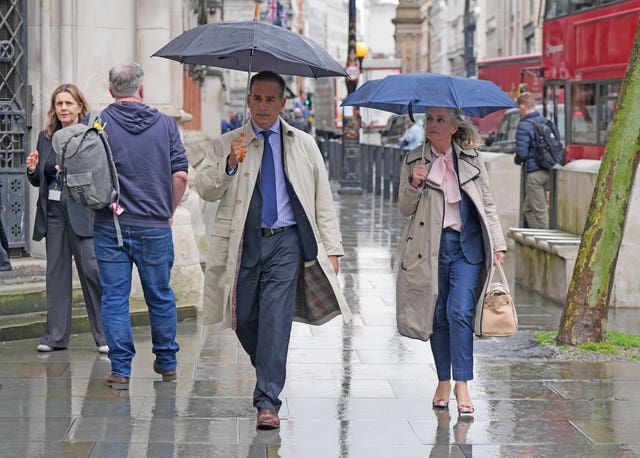The Court of Appeal has refused to change the sentence of Valdo Calocane, who killed three people in Nottingham last summer.
The 32-year-old was given an indefinite hospital order after admitting the manslaughter of Barnaby Webber, Grace O’Malley-Kumar and Ian Coates by reason of diminished responsibility, and the attempted murder of three others last June.
The Attorney General referred the sentence to the Court of Appeal in February, with lawyers arguing last week that Calocane – who suffers from paranoid schizophrenia – should be given a “hybrid” order where he would be treated before serving the remainder of the sentence in custody.
But three senior judges dismissed the bid on Tuesday, stating that while Calocane’s offences caused “unimaginable grief”, his sentence was not unduly lenient as his paranoid schizophrenia was “the sole identified cause of these crimes”.
Calocane, who attended via a video link from Ashworth high-security hospital near Liverpool, did not react as the judges gave their decision.

Giving their judgment, the Lady Chief Justice Baroness Carr said: “There was no error in the approach adopted by the judge.
“The sentences imposed were not arguably unduly lenient.”
She added: “Because the offender’s level of retained responsibility was low, and in circumstances where the offending would not have taken place but for the offender’s schizophrenia, the judge was entitled to conclude that a penal element was unnecessary.
“This was so, despite the number of victims and the extent of the harm caused.”
Baroness Carr concluded: “It is impossible to read of the circumstances of this offending without the greatest possible sympathy for the victims of these terrible attacks, and their family and friends.
“The victim impact statements paint a graphic picture of the appalling effects of the offender’s conduct.
“Had the offender not suffered the mental condition that he did, the sentencing judge would doubtless have been considering a whole life term.
“But neither the judge nor this court can ignore the medical evidence as to the offender’s condition which led to these dreadful events or the threat to public safety which the offender continues to pose.”
Dr Sanjoy Kumar and Dr Sinead O’Malley, the parents of Ms O’Malley-Kumar, attended the Royal Courts of Justice on Tuesday while the relatives of Mr Webber and Mr Coates did not appear.
In a statement following the appeal court’s decision, Emma Webber, Mr Webber’s mother, said the families “now face their own life sentence” of ensuring Calocane is not released.
She said: “Despite the fact that the Attorney General herself feels that Valdo Calocane did not receive the appropriate sentence, today’s outcome proves how utterly flawed and under-resourced the criminal justice system in the UK is. It also illustrates the need for urgent reforms in the UK homicide law.
“The fact remains, despite the words of the judge, that almost 90% of people serving hospital orders are out within 10 years and 98% within 20 years.
“In effect, the families now face their own life sentence of ensuring the monster that is Valdo Calocane becomes the next Ian Brady or Fred West and is never released.”
She added: “There are many, many more serious questions that the families will now continue to fight to get answered.
“We do not and never will agree that the vicious, calculated and planned attacks carried out were that of an individual who was at zero level of capability.”

Calocane fatally stabbed 19-year-old university students Mr Webber and Ms O’Malley-Kumar as they walked home from a night out in the early hours of June 13 last year, before killing Mr Coates and stealing his van.
He then used the vehicle to knock down three pedestrians, Wayne Birkett, Marcin Gawronski and Sharon Miller, in Nottingham city centre before being arrested.
Prosecutors accepted his not guilty pleas to murder at his sentencing at Nottingham Crown Court in January after multiple medical experts concluded he had paranoid schizophrenia.
Sentencing judge Mr Justice Turner told Calocane that his “sickening crimes” meant he would be detained indefinitely in a high-security hospital “very probably for the rest of your life”.
He also ruled that Calocane should be subject to further restrictions if ever discharged from hospital, which would need to be approved by the Justice Secretary.
While a later review found that prosecutors were right to accept Calocane’s pleas, Attorney General Victoria Prentis referred the sentence to the Court of Appeal, describing the killings as “horrific”.




Comments: Our rules
We want our comments to be a lively and valuable part of our community - a place where readers can debate and engage with the most important local issues. The ability to comment on our stories is a privilege, not a right, however, and that privilege may be withdrawn if it is abused or misused.
Please report any comments that break our rules.
Read the rules hereComments are closed on this article